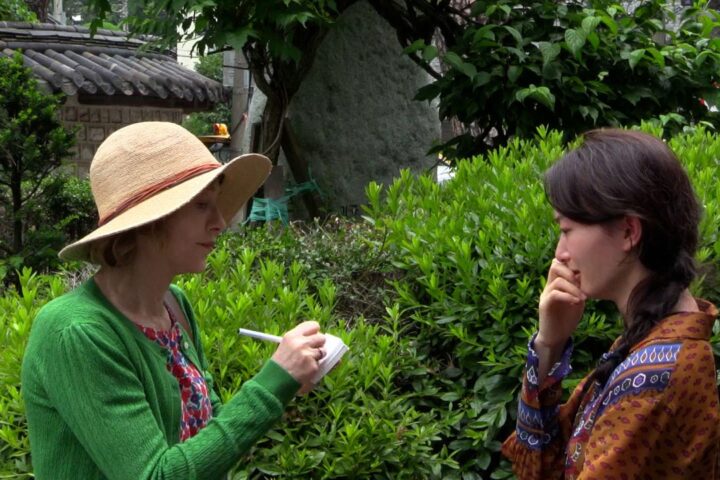The characters in Flora Lau’s Luz fabricate their reality in different ways: Wei (Xiao Dong Guo) maintains an illusion of connection to his daughter, Fa (En Xi Deng), by watching her live streams, while Sabine (Isabelle Huppert) grapples with her terminal health condition by living as if unaffected by it and the arrival of her worried stepdaughter, Ren (Sandrine Pinna), in Paris. The film’s characters are united by their search for familial intimacy, and the idea that intimacy and connection may not take shape in the way that you want it to.
The film runs on dual narrative tracks, augmented with the soft sci-fi aesthetics that one associates with virtual reality and its focus on how humans engage with technology. It jumps between a bustling, nocturnal Chongqing and a quieter, residential setting in Paris to craft parallel vignettes whose themes mirror each other thematically. But whereas Luz is visually and conceptually compelling, the writing fueling the human drama is frustratingly understated.
The film’s characters come together in the titular virtual game world, which feels dreamlike and disorienting for its blurriness of perspective. This world—whose locals are based on real cities, like Hong Kong—is equal parts fever dream and Fortnite, with the characters chasing an elusive creature known as the white deer. It’s here that Wei finds himself in as he searches for his daughter and encounters Ren, connecting the film’s narratives.
Outside of the VR world, the two storylines are told through a portrait of the quotidian as we sit with the characters and the emotional problems they face. This provides ample opportunity for cinematographer Benjamin Echazarreta to capture a Chongqing that’s awash with neon and saturated hues, granting Wei’s storyline a film-noir quality as he strolls through KTV hallways.
Tonally, it’s difficult to see where Wei’s story is taking him. As a character, he’s one note, driven by his desire to reconnect with his daughter. The most compelling moments of his storyline is when his singular desire gets questioned and we see him face the choice of either continuing to chase after his daughter or to accept the love that’s right in front of him.
It’s not a coincidence, then, that Sabine’s storyline, with its clear trajectory and conclusion, is the more emotionally charged of the two narratives. Acting opposite of Pinna, who poignantly plays the exasperated step daughter simmering with angst, Huppert captures the individualistic spirit of a person whose health is failing with grace and whimsy. As Ren and Sabine reconnect for the last time while sharing memories, the former’s interrogation of the latter about parental absence and their former family transforms slowly into a reconciliation between two women who’ve finally grown to accept each other for who they are.
In the end, the thematic dots that bind the two plotlines together do little to make up for the lack of emotional details in the film’s character arcs, which both end in understated and abrupt ways. Ultimately, it’s through the trance-like and metaphoric virtual reality world, rather than through its characters, that the film best conveys its themes of modern intimacy and alienation.
From the mundane process of Wei putting on the game gear in his living room, to passing through a grimy VR bar where you can ask a digital bartender anything, the contrast between high-concept technology and prosaic daily experiences is what feels most striking about Luz. One can easily imagine a few years from now a world where this type of reality and escapism will be accessible to anyone longing for the intimacy that Lau’s characters chase after. It’s no surprise, then, that Luz is a film more interested in capturing the glitchy moodscape of virtual reality than it is in excavating the emotional turmoil of its characters.
Since 2001, we've brought you uncompromising, candid takes on the world of film, music, television, video games, theater, and more. Independently owned and operated publications like Slant have been hit hard in recent years, but we’re committed to keeping our content free and accessible—meaning no paywalls or fees.
If you like what we do, please consider subscribing to our Patreon or making a donation.





